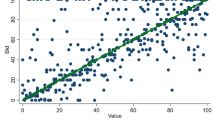Abstract
We analyze a simple arbitration procedure which is a multi-stage variant of Nash's demand game. In the absence of discounting, all Nash equilibria of the game yield the egalitarian solution in the first stage. The crucial feature of our arbitration procedure is that, in the case of incompatible demands, the game is allowed to continue and the player who demands the higher gain over the disagreement point is penalized by restricting her or his feasible demands in the following stage. Suitable modifications of the arbitration game yield the lexicographic extension of the egalitarian solution, resp. the proportional solutions. Journal of Economic Literature Classification Numbers: C72, C78.
Similar content being viewed by others
References
Anbarci N (1992) Nash's demand game revisited. Mimeo, SUNY at Buffalo
Anbarci N (1993) Noncooperative foundations of the area monotonic solution. Q J Econ 108: 245–258
Anbarci N, Bigelow JF (1994) The area monotonic solution to the cooperative bargaining problem. Math Soc Sci (forthcoming)
Binmore K (1987) Nash bargaining theory II. In: Binmore K, Dasgupta P (eds), The Economics of Bargaining. Blackwell, Oxford pp 61–76
Binmore K, Rubinstein A, Wolinsky A (1986) The Nash bargaining solution in economic modelling. RAND J Econ 17: 176–188
Carlsson H (1991) A bargaining model where parties make errors. Econometrica 59: 1487–1496
Chun Y (1989) A noncooperative justification for egalitarian surplus sharing. Math Soc Sci 17: 245–261
Howard JV (1992) A social choice rule and its implementation in perfect equilibrium. J Econ Theory 56: 142–159
Imai H (1983) Individual monotonicity and lexicographic maximin solutions. Econometrica 51: 389–401
Kalai E (1977) Proportional solutions to bargaining situations: interpersonal utility comparisons. Econometrica 45: 1623–1630
Kalai E, Smorodinsky M (1975) Other solutions to Nash's bargaining problem. Econometrica 43: 513–518
Moulin H (1984) Implementing the Kalai-Smorodinsky bargaining solution. J Econ Theory 33: 32–45
Myerson R (1977) Two-person bargaining problems and comparable utility. Econometrica 45: 1631–1637
Nash J (1950) The bargaining problem. Econometrica 18: 155–162
Nash J (1953) Two-person cooperative games. Econometrica 21: 128–140
Osborne MJ, Rubinstein A (1990) Bargaining and Markets. Academic Press, New York
Peters H, Tijs S, Zarzuelo J (1991) Consistency and implementation of the Kalai-Smorodinsky bargaining solution. Reports in Operations Research and Systems Theory M 91-09, University of Limburg, Department of Mathematics
Rubinstein A (1982) Perfect equilibrium in a bargaining model. Econometrica 50: 97–109
Rubinstein A (1992) On the interpretation of two theoretical models of bargaining. Tel-Aviv University Working Paper No. 7–92.
Rubinstein A, Safra Z, Thomson W (1992) On the interpretation of the Nash bargaining solution and its extension to non-expected utility preferences. Econometrica 60: 1171–1186
Selten R (1975) Reexamination of the perfectness concept for equilibrium points in extensive games. Int J Game Theory 4: 25–55
Thomson W (1994) Bargaining Theory: The Axiomatic Approach. Academic Press, New York (forthcoming)
van Damme E (1986) The Nash bargaining solution is optimal. J Econ Theory 38: 78–100
van Damme E (1987) Stability and Perfection of Nash Equilibria. Springer, Berlin
Author information
Authors and Affiliations
Additional information
Financial support through grants from the Social Sciences and Humanities Research Council of Canada and the University of Waterloo is gratefully acknowledged. Earlier versions of the paper were presented at McMaster University and Brock University. The authors thank Nejat Anbarci, Michele Piccione, Venkatraman Sadanand, an editor, and the referees for their useful comments.
Rights and permissions
About this article
Cite this article
Bossert, W., Tan, G. An arbitration game and the egalitarian bargaining solution. Soc Choice Welfare 12, 29–41 (1995). https://doi.org/10.1007/BF00182191
Received:
Accepted:
Issue Date:
DOI: https://doi.org/10.1007/BF00182191




